 | |
| Time in Den Haag (GMT+1) Daylight saving time: +1 hour | UN war crimes tribunal indicted five Croatian journalists for contempt of court |
|
|
 ICTY Judgement: IT-95-14R.77.6 ICTY Judgement: IT-95-14R.77.6Carla Del Ponte vs. Domagoj Margetic! |
 Hague Indicts Croat Reporter Domagoj Margetić Hague Indicts Croat Reporter Domagoj Margetić For Contempt Associated Press, September 12, 2006 THE HAGUE (AP)--The Yugoslav war crimes tribunal Press freedom advocates have protested the court's decision to prosecute reporters, arguing that judges are far too liberal in granting prosecution requests to allow witnesses to testify anonymously. The Hague-based The list of some 120 witnesses, many of whose identities were supposed to be protected, was given to Margetic by tribunal prosecutors as part of a previous contempt case against him that was dropped earlier this year, prosecution office spokesman If convicted, Margetic faces a maximum punishment of seven years in prison and a fine of $127,000. Last month, the court convicted another Croatian journalist, Josip Jovic, for contempt of court and fined him $25,400 for publishing the name and testimony of a protected witness. "It is the duty of the media to expose the functioning of the courts...to public debate, especially when their functioning - at the very least - raises questions," "He was fully aware of the confidentiality of this information that he received," said "It's a blatant, blatant violation of the (non-publication) order and it goes against one of the pillars of the tribunal and that is the ability of the tribunal to protect witnesses in war crimes trials," he added. Margetic is believed to be at large in Croatia. The tribunal has asked Croatian authorities to hand him over for trial in The Hague. |
 Croatian journalist pleads not guilty to contempt at Yugoslav war crimes tribunal Croatian journalist pleads not guilty to contempt at Yugoslav war crimes tribunal The Associated Press, October 13, 2006 THE HAGUE, Netherlands A Croatian journalist pleaded not guilty Friday to contempt of court for allegedly publishing the names of witnesses whose identities were withheld from the media and public when they testified at the Yugoslav war crimes tribunal. Domagoj Margetic faces a maximum sentence of seven years imprisonment and a fine of €100,000 ($125,400) if convicted. Tribunal judge Alphons Orie did not immediately set a trial date. The U.N. court formally known as the International Criminal Tribunal for the former Yugoslavia, or ICTY, alleges that Margetic published the names of witnesses on his Web site in July and August, despite being warned that the names were confidential. The list of some 120 witnesses, many of whose identities were supposed to be protected, was given to Margetic by tribunal prosecutors as part of a previous contempt case against him that was dropped earlier this year. Earlier this year, the tribunal convicted another Croatian journalist, Media advocacy group But the tribunal insists it must be able to shield witnesses who may otherwise refuse to testify for fear of reprisals. By publishing the names of witnesses who testified several years ago in the tribunal's trial of Margetic told Orie he was suffering health problems "with my heart and other organs" after staging a 33-day hunger strike earlier this year when he was detained by Croatian authorities on orders from the tribunal. But he added, "I wish to thank the ICTY staff for their assistance in helping me enter the premises of the tribunal as I do have difficulty walking." |
|
(TU No 466, 1-Sep-06) Croatian journalist Jovic, who had faced up to seven years’ imprisonment as well as a fine of 100,000 euro, waived his right to appear at the judgment on August 30, and was represented by his defence counsel Kresimir Krsnik. Jovic announced to the Croatian news agency HINA that he plans to appeal the decision. "It is an absurdity from the point of view of law and common sense, from the indictment to the judgement," he said. At his one-day hearing on July 11 this year, Jovic admitted publishing the identity and excerpts of the closed testimony of Stjepan Mesic, the current president of Croatia, who had testified as a protected witness in the Presiding judge Patrick Robinson dismissed this defence, saying “an error of law is no answer to this charge”. Robinson said that Jovic had treated the tribunal "with utter disregard” and that his actions “stymied the tribunal's ability to safeguard the evidence of a protected witness and risked undermining confidence in the tribunal's ability to grant effective protective measures". Rejecting the defence claim that Jovic was exercising freedom of the press in reporting a matter of public interest, the judge upheld the right of the tribunal to restrict press freedom where necessary. “It’s not for individuals… to choose to publish information in defiance of such orders on the basis of their own assessment of the public interest of that information,” he said. The fact that the Blaskic trial chamber had concluded at the time of publication was dismissed by the judge as “irrelevant” as protected measures for witnesses continue after conclusion of trial. The judge noted that Mesic’s public admission that he testified as a witness in the Blaskic trial was a mitigating factor. But he said that Jovic’s acts had been “particularly egregious”. Judge Robinson added that he had “compounded this contempt” by continuing to publish the testimony across 22 editions, “while boasting that the transcript was secret”. |
 stages hunger strike stages hunger strike 08/08/2006 ZAGREB, Croatia -- Reporter  Domagoj Margetić arrested Domagoj Margetić arrested A Croatian journalist has been arrested A Croatian journalist has been arrestedat the request of the UN war crimes court for allegedly disclosing the names of dozens of protected witnesses, reports said yesterday.  Report on Rwanda tribunal's disturbing precedents is published as ex-Yugoslavia tribunal fines Croatian journalist Report on Rwanda tribunal's disturbing precedents is published as ex-Yugoslavia tribunal fines Croatian journalist 31 August 2006 A day after a Croatian journalist was fined by the International Criminal Tribunal for the former Yugoslavia (ICTY), The ICTY yesterday imposed a fine of 20,000 euros on Slobodna Dalmacija editor Josip Jovic for revealing the identity of a protected witness who secretly testified in 1997 in Another journalist,  Domagoj Margetic, was meanwhile arrested again on 4 August at the ICTY’s behest for posting the names of 102 protected witnesses on a website. The ICTY has found him in contempt of court for defying a ban on identifying the protected witnesses who testified at Blaskic’s trial in 1997. Domagoj Margetic, was meanwhile arrested again on 4 August at the ICTY’s behest for posting the names of 102 protected witnesses on a website. The ICTY has found him in contempt of court for defying a ban on identifying the protected witnesses who testified at Blaskic’s trial in 1997. |
June 15 2006 Chief UN war crimes prosecutor Carla Del Ponte said Thursday she will drop contempt charges against three Croatian journalists accused of publishing the name of a protected witness who testified during the 1997 trial of Bosnian Croat general Tihomir Blaskic. "The office of the prosecutor is under increasing pressure .. to limit the scope of its prosecutions. Thus I choose to exercise my prosecutorial discretion not to proceed with the case against (Stjepan) Seselj, (Domagoj) Margetic and (Marijan) Krizic," Del Ponte said in a statement. Krizic is the editor-in-chief of the weekly magazine Hrvatsko Slovo, which also employs Seselj and Margetic as journalists. Contempt charges against Josip Jovic, editor-in-chief of the Croatian daily Slobodna Dalmacija, for a similar alleged offence will remain. A contempt conviction carries a maximum sentence of seven years in prison and a 100,000 euro (121,000 dollar) fine. In March former Croatian intelligence chief Markica Rebic and Ivica Marijacic, editor-in-chief of the Hrvatski List newspaper were fined 15,000 euros (18,150 dollars) for contempt of court. Rebic was convicted for supplying Marijacic with the name of a protected witness who testified in the Blaskic case in 1997. Hrvatski List published the name in November 2004. Although the indictment does not specify, it is widely believed that the charges centre on the same protected witness. Witness protection is a key focus of the ICTY as it tries to gather evidence of war crimes committed during the Balkan conflicts of the 1990s. |
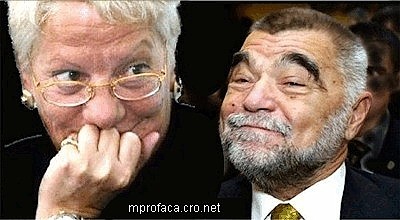 Stjepan Mesić, Stjepan Mesić, Croatian President: "I was protected witness. Testimony transcript publishing wasn't noxious for me, it suits me, on condition that they (journalists) don't falsify things." Source: Vjesnik daily, November 28, 2000.
of the ICTY protected witness a long time before it was just repeated by now indicted Croatian journalists CHRONOLOGY Decision of Trial Chamber I on request of the prosecutor of 12 and 14 May 1997 in respect of the protection of witnesses Decision of: 6 June 1997
The Trial Chamber will first analyse the arguments of the parties and then discuss all the contested points of fact and law. I. Analysis of the arguments and claims of the parties 2. Further to the disclosure on 9 May 1997 of Mr. Stipe Mesic's testimony in two Croatian newspapers - the "Vecernji List" the "Vjesnik", in a request dated 12 May 1997, the Prosecutor requested that the Judges of Trial Chamber I adopt a set of additional protective measures in respect of the identity of the witnesses and the statements disclosed to the Defence." [...] A. The Examination [...] 7. As regards the disclosure of the identity and statement of the witness Stipe Mesic to two Croatian newspapers, the Trial Chamber notes that the said witness was not covered by any protective measures insofar as no request was made that he be covered and no decision granting such request was ever issued. In this respect, the Judges point out that the terms of Furthermore, the Judges state that it would be extremely difficult to determine who is responsible for such disclosure. The Trial Chamber considers finally that the start of the trial should not be further postponed. The conclusion of the Trial Chamber is that conducting an examination into the circumstances under which the identity and statement of the witness Stipe Mesic were disclosed would therefore be inappropriate and consequently rejects this request. [...] 10. In respect of the further measures which the Prosecutor has requested, because of the disclosure and publication to the Croatian press of Mr. Mesic's statement and because of the general conditions currently prevailing in the territory of the former Yugoslavia, the Trial Chamber is extremely concerned about the security of the witnesses who may be called to make a statement before it during the trial. It therefore deems that the accused, his counsels and their representatives must not disclose to the public or to the media the name of the witnesses from certain areas of the former Yugoslavia or any information which might make it possible to identify them, unless this is absolutely necessary for preparing the defence. The Trial Chamber also considers that additional measures must be implemented by both parties in order to guarantee satisfactory protection of the witnesses. [...] Croatia/Tribunal Relations Croatian President-elect Stipe Mesic is defining himself as much by who he is as by who he is not: namely the late President Franjo Tudjman. Unlike the often stiff and formal Mr. Tudjman, Mr. Mesic is casual and accessible. Whereas Mr. Tudjman was autocratic and nationalistic, Mr. Mesic says he will be democratic and European. And while Mr. Tudjman increasingly refused to cooperate with the War Crimes Tribunal, President-elect Mesic not only says he agrees with the Tribunal's work, but he has personally supported it in the past - as a witness. Two years ago, Stipe Mesic became the only high- ranking Croat to testify for the prosecution. He did so in two Tribunal cases, one of them against a Bosnian Croat general. He now says he wants once again to tell what he knows - this time against Yugoslav President Slobodan Milosevic, who has been indicted for war crimes. Deputy Prosecutor, Graham Blewitt, says he is looking forward to working with Mr. Mesic: "He was very cooperative. And at that time, he indicated he was prepared to do anything he could to cooperate with the Tribunal and to assist our work because he believed that it was essential in bringing long-term peace to the region. So, the fact that he is now the President of Croatia, and because of our previous relationship with him, we find that extremely encouraging. I think our relationship with Croatia will do a complete 180 degree turn now." Tribunal interpreters Vladimir Loyen and Nenad Popovic say a Croatian term -- Haski Svjedok -- which means "Hague witness" may be losing the negative connotations it had when the Croatian media used it against the new president-elect. Loyen: So that's why we feel weird, because two months ago we were bordering on being enemies of the state and now we may even be heading for the heroes of the state. Popovic (overlaps): Yeah, we have become with him, with Haski Svjedok becoming the president we're also like heroes and the avant guards of the new Croatian outlook. Prosecutors have yet to meet with President-elect Mesic and test how that new Croatian outlook translates into cooperation. They say they will give the new government time to settle in and become familiar with the issues before doing so. But by April, they say they expect some very productive high- level meetings. Source: Croatia/Tribunal Relations, Voice of America - VOA, February 11, 2000 Published by IWPR Institute for War & Peace Reporting Analysis: New Phase in Milosevic Trial The prosecution sets out to try and prove that Milosevic was responsible for Serb atrocities in Croatia and Bosnia. By Mirko Klarin in The Hague (TU No.281, 16-21 Sep. 2002)  The Milosevic trial, yesterday, September 26, enters a
new phase with the prosecution attempting to establish a connection between the defendant and war crimes committed in Croatia and Bosnia in the first half of the 1990s. The Milosevic trial, yesterday, September 26, enters a
new phase with the prosecution attempting to establish a connection between the defendant and war crimes committed in Croatia and Bosnia in the first half of the 1990s.[...] The prosecutor's pre-trial brief conceals the witnesses' identity through code-names. So far only one code-name can be "deciphered" with confidence. Witness B-1230 must be the Croatian president, Stipe Mesic, as this witness will tell the court how he organised the secret meeting between Milosevic and then Croatian president Franjo Tudjman on March 25, 1991 at which they agreed on a division of Bosnia. Mesic has already publicly testified about these events in the trial of the Serbian mayor of Vukovar, Slavko Dokmanovic, and in closed session in the trial of Croatian general Tihomir Blaskic, for crimes committed in central Bosnia. [...] Published by IWPR Institute for War & Peace Reporting Controversy Over Document Leak Resurfaces Evidence cited in Milosevic trial raises issues about who leaked Croatian president Mesic's secret testimony. By Emir Suljagic in The Hague (TU 318, 23-27 June 2003) 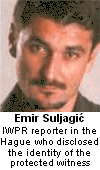 Allegations that the lawyer who defended Bosnian Croat general Tihomir Blaskic before The Hague tribunal may have leaked confidential evidence resurfaced at another hearing this week. Documents which Hague prosecutors handed to former Serbian president Slobodan Milosevic as evidence suggest that prominent Zagreb lawyer Ante Nobilo passed the Croatian leadership a secret statement that Stjepan Mesic - now president, but opposition leader at the time - gave during Blaskic's 1997 hearing.
Allegations that the lawyer who defended Bosnian Croat general Tihomir Blaskic before The Hague tribunal may have leaked confidential evidence resurfaced at another hearing this week. Documents which Hague prosecutors handed to former Serbian president Slobodan Milosevic as evidence suggest that prominent Zagreb lawyer Ante Nobilo passed the Croatian leadership a secret statement that Stjepan Mesic - now president, but opposition leader at the time - gave during Blaskic's 1997 hearing. Nobilo still represents Blaskic, who is appealing after being convicted on 19 counts of war crimes and crimes against humanity. He has consistently denied involvement in leaking the statement - in which Mesic accused the then Croatian leadership of complicity in atrocities in neighbouring Bosnia - since excerpts from it appeared in a newspaper back in November and December 2000. The new documents consist of transcripts, including one which appears to be of a May 1997 meeting between the late Croatian president Franjo Tudjman, his chief of staff Goran Radin, defence minister Gojko Susak, National Security Advisor Markica Rebic, and two newspaper editors. (») This contains what purports to be a discussion on whether to publish Mesic's testimony, as a way of portraying the increasingly popular opposition politician as a traitor. 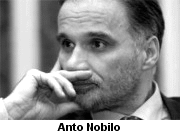 he said it would be good to publish it - but we can't say that he gave us the statement because he has to be discreet," one of the participants is reported as saying. Tudjman, who habitually recorded all his meetings for posterity, told the newspaper editors, "Mr. Mesic has gone and testified that I should be summoned to the Hague tribunal. We want you to publish the document, but we also want to talk about it with you." In a telephone interview, Nobilo told IWPR that these transcripts were inaccurate. "Those allegations were raised long ago. There is no truth in it," he said. Under the rules of the tribunal, Mesic's statement was supposed to remain anonymous, with only the prosecution and defence knowing that he had testified. Whoever did release it was acting in contempt of court.
Although the transcripts - if true - confirm that the Croatian leadership got hold of Mesic's testimony, Tudjman's proposal to publish it in the press was not acted on at the time. Excerpts appeared much later - in November 2000 - in Slobodan Dalmacija, a Croatian newspaper with strong ties to Tudjman's right-wing Croatian Democratic Union, HDZ. This was widely perceived as a smear attempt against Mesic, who had just become president. The Mesic statement was relevant in the Blaskic trial because the latter was in command of Bosnian Croat forces in central Bosnia. Many of the charges against him related to the 1993 massacre of Muslim civilians in the village of Ahmici. Tudjman always maintained that Zagreb had nothing to do with the actions of Bosnian Croat military forces. In 2000, at the end of a two-year trial, Blaskic was sentenced to 45 years jail. 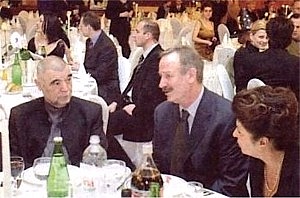 Please, stop "helping"
Please, stop "helping" indicted journalists!  By Mario Profaca
By Mario ProfacaOctober 7, 2005 Confused and incompetent Dragutin Lucic, president of irrelevant Croatian Journalists' Association (since no one of ICTY indicted Croatian journalists is a member of that, one of three journalists' professional associations in Croatia) keeps giving his Pythian "statements" referring to the case of Croatian journalists indicted with contempt of the Hague Tribunal. Lucic told 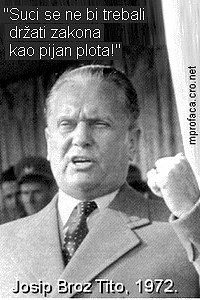 At the same time, Dragutin Lucic told Janet Anderson
At the same time, Dragutin Lucic told Janet Anderson Evidently, there are so many "individuals" including Dragutin Lucic in the Croatian Journalists' Association who should better stop "defending" indicted Croatian journalists as soon as possible. It would be also the biggest help for Josip Jovic who is now detained in Split prison waiting his extradition to the International Criminal Tribunal for (war crimes committed in) the Former Yugoslavia (ICTY). Mario Profaca CPJ, journalism and intelligence  By Mario Profaca
By Mario Profaca
Aleksandar ("Alex") Lupis, Europe & Central Asia Program Coordinator, Committee to Protect Journalists (CPJ), has a decade of experience working on human rights and press freedom issues in the Balkans and former Soviet republics. But less known is that he worked two years (1997-98) with the ICTY Office of the Prosecutor as "researcher". Born somewhere near Dubrovnik, he speaks a language he calls "Serbo-Croatian", English and Russian. He worked in Bosnia for 18 months conducting war crimes and human rights investigations for the Vienna-based Organization for Security & Cooperation in Europe (OSCE) in 1996-97. In February 2005 Aleksandar Lupis said to Vecernji list newspaper (Zagreb, Croatia): "We are familiar with the newest events about (Jadranka Juresko-Kero, Vecernji list, Zagreb). Since As "Aleksandar Lupis has confirmed for Vecernji list that in their American headquarters came official report about problems that Croatian journalists facing with" so United Press International and The Washington Times reported about problems British MI6 informants (citizens-informants and confidential collaborators) were facing in Croatia. Writing about "The Croatian media are abuzz about the continued employment of a journalist reportedly outed as a MI6 (British overseas intelligence) agent and disinformation agent. Zeljko Peratovic writes for the journal Vjesnik. According to the media, Peratovic distributed -- and apparently still distributes -- disinformation on the whereabouts of Croatian Gen. Ante Gotovina to help avoid his capture." [...] "Despite being unmasked by the former head of Croatian counter-intelligence, Franjo Turek, Peratovic remains a journalist. Croatia's President Stjepan Mesic confirmed Peratovic's role in the Feral Tribune, issue no. 967, which stated that six journalists, including Gordan Malic of the Globus wire service, plus ex-police chief Ranko Ostojic and several British diplomats supplied misleading information to the Croatian public that Gotovina was in Croatia. Mesic's former national security aide, Zeljko Bagic, warned him MI6 spies and British intelligence had recruited a number of prominent journalists in Zagreb to plant disinformation about Gotovina in the Croatian media. Obviously, Aleksandar Lupis is familiar with this part of the story; In 2000 he was "working on a book" about investigating war crimes in Bosnia. Interestingly, one issue he discussed in the book was assessing / analyzing the national security / intelligence institutions, which is - just to use his own words - "something human rights people generally stay away from". He was He was Special Assistant for South East Europe at the Open Society Institute in New York focusing on the Balkan Stability Pact. I worked previously as a consultant to Human Rights Watch - Helsinki and as a Human Rights Officer with the OSCE Mission to Bosnia and Herzegovina in the towns of Capljina and Doboj. I am currently conducting research, during my personal time, on developing a war crimes and human rights field investigation manual using case studies from the former S.F.R. Yugoslavia. - He was one of over 180 participants at a Bosnian Conference, convened by the Office of Refugee Resettlement (ORR), held in Washington, DC, on November 12-13, 1999. A panel discussion titled "Bosnian Diaspora: What Do We Need to Know?" was held at the Carnegie Endowment for International Peace. Discussion was facilitated by Ms. Kathleen Newland of the Carnegie Endowment and had four panelists: Mr. Nedzib Sacirbej, Ambassador-at-Large of Bosnia and Herzegovina; Aleksandar Lupis, Soros Foundation; Harold Northrop, International Rescue Committee (IRC); and Catherine Schwering, U.S. Department of State. Mr. Lupis spoke about the Soros Foundation Lawyers' Project in Bosnia and human rights and democracy in general. Lupis joined the Committee to Protect Journalists in September 2000. On July 18, 2001, on behalf of Committee to Protect Journalists (CPJ) Aleksandar Lupis testified before the joint hearing of the International Operations and Human Rights and Middle East and South Asia subcommittees of the House International Relations Committee about the state of press freedom in Central Asia. A testimony was part of a hearing on "Silencing Central Asia: The Voices of Dissent," held to investigate the state of freedom and democracy in Central Asia. According to On December 25 2002, when Russian environmental journalist Grigory Pasko was convicted for treason through espionage by the Pacific Fleet Court in Vladivostok, and taken into custody in court and placed in detention, the Committee to Protect Journalists (CPJ) called the verdict -- Today's ruling demonstrates that the trial of Grigory Pasko was nothing more than a political vendetta against a journalist who made public information that embarrassed the Russian military but served the public, its director, Joel Simpson said in a statement. -- Pasko's detention is a black mark on the Russian justice system and further undermines President Putin's stated commitment to press freedom. (An outrageous decision, By Jon Gauslaa, 2002-01-03) In October 2002 the US Congress is considering legislation that would attempt to counter efforts by repressive governments, including those in the Caucasus and Central Asia, to restrict public access to information. The measures focus on electronic media, noting that "unrestricted access to news and information on the internet is a check on repressive rule by authoritarian regimes around the world." Media watchdogs characterize the proposed US legislation as "helpful," but stress that laws would need accompanying support for journalists in order to advance freedom of expression in the Caucasus and Central Asia, and elsewhere. On October 2, United States Representatives Christopher Cox (R-California) and Tom Lantos (D-California) introduced the Global Internet Freedom Act, a bill aiming to frustrate foreign governments' efforts to censor Internet use. Jon Kyl (R-Arizona) and Ron Wyden (D-Oregon) introduced a companion bill in the Senate eight days later; both bills are sitting in committees while members of Congress campaign before November elections. "This legislation will definitely be helpful in protecting the free flow of information," said But in the case of Oddly enough, to Mr. Lupis and CPJ it's not quostionable at all whether The International Criminal Tribunal for (war crimes commited in) Former Yugoslavia is entitled to try journalists or not; As he wrote to me - "We are trying to get more information from the Tribunal about the kind of penalty they are seeking and hope they will be more forthcoming. That information will help clarify the status of this case". After I asked Mr. Lupis how come that CPJ had nothing about it at its official web site, though Croatian journalist Josip Jovic was arrested, detained and waiting in prison for his extradiction to the Hague, CPJ on October 7, 2005, finally released its "Alert": "Court-imposed gag orders on news organizations are very troubling, and there are unanswered questions about the Tribunal's actions," Mario Profaca *) Grigory Pasko was arrested in November 1997 and acquitted by the Pacific Fleet Court in July 1999 of treason charges, but found guilty of abuse of office. He appealed the verdict seeking a full acquittal, but so did the prosecution insisting he was a spy. Russia's Military Supreme Court cancelled the verdict and sent the case back to a re-trial in November 2000. The re-trial started on July 11, 2001 and ended on December 25, with Pasko being acquitted on nine out of ten charges, but still sentenced to four years. Both sides have appealed the verdict. It may take many months before the appeal case will be heard. Bibliography: Aleksandar Lupis' works in the intelligence and security field:  Assessing the Mandate of the OSCE Kosovo Verification Mission Proposed at Rambouillet: Assessing the Mandate of the OSCE Kosovo Verification Mission Proposed at Rambouillet: An Insider's Perspective from the OSCE Mission to Bosnia and Herzegovina By Alexander Lupis, April 1999. This paper was subsequently updated and published in Helsinki Monitor 1999 no. 3 | ||||||||||||||||||||||||||
| Audio and Video Streaming courtesy XS4ALL Internet, Amsterdam, and Radio Slobodna Evropa, Praha | ||||||||||||||||||||||||||

 1
1
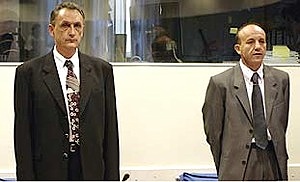
 IPI/SEEMO Demands Reform of Hague
IPI/SEEMO Demands Reform of Hague 
 Stjepan Mesić personally disclosed that he was ICTY protected witness and also confirmed the authenticity of published transcripts of his "secret" testimonials
Stjepan Mesić personally disclosed that he was ICTY protected witness and also confirmed the authenticity of published transcripts of his "secret" testimonials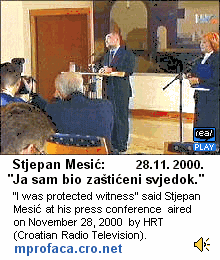
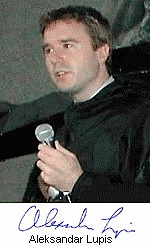 Lupus in fabula
Lupus in fabula